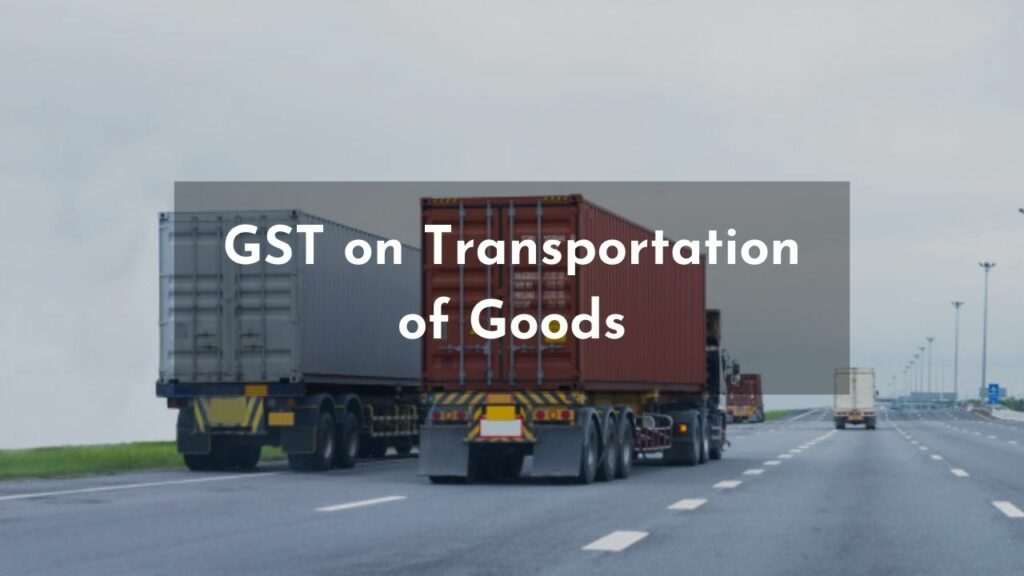GST on Transportation of Goods
GST on Transportation of Goods
Transportation is an important part of the economy since it disrupts the whole business channel. As a result, variations in gasoline prices have a broad impact on business disruption. In India, road transportation is the most popular means of commodities movement. According to the Indian National Highway Authority, road transportation accounts for around 65 percent of freight traffic and 80 percent of passenger travel. A transporter or courier agent transports goods on the road.

How is GST Applied to The Transport of Goods?
GST on transport items must be paid under the current GST regime when the following four services are provided:
- Loading and unloading of goods
- Packing and unpacking of goods
- Transporting or shipping of the goods
- Warehousing
The applicable GST rate is determined by the mode of transportation and the type of transport of goods:
- Transport of relief at the time of calamities – No GST
- Foodgrains and dairy products – No GST
- Agricultural produce/products – No GST
- Defence material for the military – No GST
- Newspaper/magazine – No GST
- Transport of personal goods or household goods – No GST
- Transport of goods of unregistered persons – No GST
- Rental trucks or other road vehicles – 18%
- Rental aircraft to carry goods – 18%
- Rental water vessels – 18%
The input tax credit, or ITC, is particularly important in calculating GST. An input tax credit is a claim for credit for GST paid on the purchase of any goods or services utilised for business purposes. The ITC is the cornerstone of GST. If the ITC cannot be claimed, a 5% GST is levied on transportation, and a 12% GST is levied if the ITC is claimed.
Importance of Consignment Note
The two key documents involved in the transportation of goods are:
- Consignment note
- eWay Bill
The transportation agency issues the consignment note for the reception of items for transit by highways. If a person hires a packer and mover to relocate their household items from Lucknow to Bengaluru, they will be given a consignment note once their products have been packed and put into the truck.
This consignment notice indicates that the GTA is now responsible for the products until they are delivered to the delivery destination. However, creating a printed or soft copy of the consignment letter is free of charge. The consignment note simply states the information of the products to be transferred as well as the GST levied and who is responsible for paying it. just before the products are carried out, the eWay bill is created on the eWay bill official website. This document ensures that all GST laws and regulations are followed.
Is the GTA Liable to Register under GST?
If a GTA exclusively transports items for which the entire tax is paid by the recipient under the reverse charge method, the GTA is not required to register for GST. This is true even if the revenue surpasses Rs. 20 lakhs.
Reverse Charge For A GTA
The reverse process was implemented by notification in June 2017, and if a person uses GTA services in a taxable region, the GST supplier gets taxed at a rate of 12%. When using this option, the supplier can claim a full input tax credit on items and services used to transfer products to the receiver.
The below-mentioned businesses are prescribed to pay GST on a reverse charge basis:
- Societies registered under the Societies Registration Act, 1860
- Factories registered under or regulated by the Factories Act, 1948
- Co-operative societies established by or under any law
- Persons registered under CGST, SGST, UTGST, or IGST
- Body corporates established under or by any law
- Partnership firms, whether registered or not, under any law including association of persons
- Casual taxable persons located in any taxable region
If the GTA does not use the reverse charge system, the recipient of goods or services is responsible for paying the GST. If the beneficiary does not fit into any of the above-mentioned categories, the GTA is obligated to pay.
FAQs on GST On Transportation Of Goods
Is Freight Subject to GST?
Gst is levied whenever a product is sold or a service is rendered. Freight attracts GST because goods conveyed in any manner are considered a service.
What is the Exemption of GST under the Transportation of Goods?
Any service provided by an individual or firm that is not a transportation or courier business is exempt from the GST. In other words, if a friend transfers certain household items for you from one city to another, they won’t be charged GST.
All registered businesses and individuals in the transportation sector must have an eWay bill. The names of the consignee and consignor, together with the amount of GST paid on the commodities being transported, must be written on the manifest.



